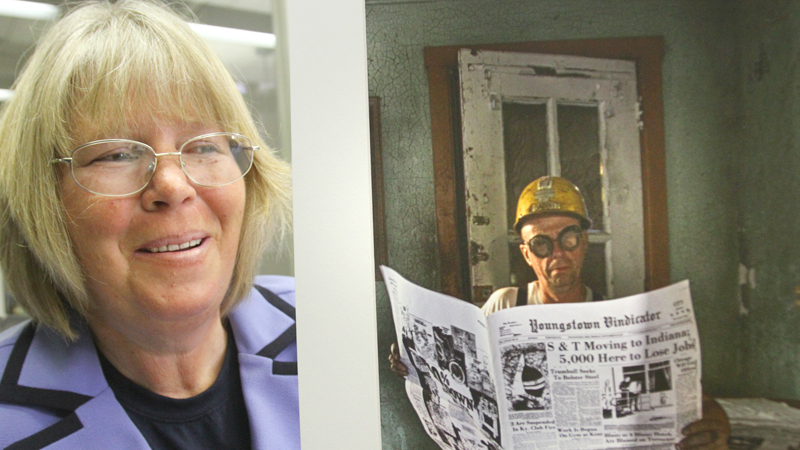Campbell photographer has lens on Valley history

By JESSICA HARDIN
jhardin@vindy.com
CAMPBELL
The first thing you notice when you see Diane Beatty’s photograph of a steelworker is the size of his hands.
He sits with his unnaturally large hands clasped between his knees. An idle blast furnace looms behind him like a spaceship.
“I wanted a picture of him in front of a blast furnace. Unfortunately they took that last one down in Warren with no public notice whatsoever. They just tore it down,” Beatty said.
So she and her model, Tim Sokoloff, president and founder of Iron Soup Historical Preservation Co., traveled to Swissvale, Pa., to photograph him in front of the Carrie Furnace.
The work is titled, “What will I do with these idle hands?”
Beatty, of Campbell, uses
photography to preserve history that is slipping away.
“I think it’s important more so now, because the memory of it is fading. The older people who lived through it are slowly passing. The younger people don’t really understand what it was like to live through that and what devastation it is,” Beatty said.
The last year has provided ample material for portraying the human effects of negative economic news – the closures of countless retail sites, the shutdown of of Northside Regional Medical Center and the idling of the GM Lordstown Assembly Complex.
She was particularly struck by the timing of the news of Lords-
town’s closure.
One of Beatty’s photographs shows Santa sitting beneath the “Furnitureland” sign downtown, reading the issue of The Vindicator that announced GM’s decision.
“It was the 26th of November. I had saved The Vindicator ... that’s less than a month from Christmas that they got this news,” Beatty said.
Another image in the series is a black and white photograph of the shuttered Toys R Us in Boardman. Santa pops in red, peering into the window of the abandoned store.
“You might think, ‘Just a couple stores closed in the community.’ But two or three years ago, the [Toys R Us] distribution center closed. That was a lot of jobs ... I remember when the distribution center was built,” Beatty said.
Beatty, who works as a letter carrier by day, started staging these images while photographing the Campbell company homes, the complex built to house employees of Youngstown Sheet & Tube’s Campbell Works. She connected to the site as an artist but also because of her family history.
Three of Beatty’s uncles came to Youngstown to work in the mills after returning home from World War II.
“When I go into places that are run down, I try to picture, what was it like when it was at its peak? When I was walking around the company homes, I was seeing the soldiers coming home from the war. In the middle of the company homes, there is this empty space. I could see children running and laughing and playing and the smells of the different foods that were cooking,” Beatty said.
She was inspired by a commercial that aired in the 1970s of a Native American man walking around the United States, seeing trash and pollution. At the end of the commercial, a tear ran down his face.
“What if I could get someone to dress up like a steelworker coming back to the site to see the site as it is? Because at one point in time, the company homes [were] the place to be,” said Beatty.
She conceived of the idea shortly before the 40th anniversary of Black Monday in 2017, and used the images to commemorate the day.
Her piece “More Than 5,000” depicts a steelworker sitting on a chair in a company home reading The Vindicator. The front page head line reads, “S&T Moving to Indiana. 5,000 Here to Lose Jobs.”
He’s still wearing his work glasses and hard hat. His lunchbox and Thermos sit on the table beside him.
The image is a punch in the gut.
It’s even more striking in light of Lordstown’s impending closure. Beatty sees parallels between Black Monday and Nov. 26, 2018, the day GM announced the closure of the Lordstown plant.
“The 5,000 [Sheet & Tube jobs lost] was [only] workers. It didn’t account for the people who supported them. It didn’t account for the families, just like now with General Motors,” Beatty said.
Beatty is working on a new series about Lordstown that captures the personal effects of this type of loss, including divorce, alcoholism and suicide.
“We haven’t recovered from Black Monday in 1977. This is just another blow,” Beatty said.
Beatty’s art can be viewed at regional shows, such as the Youngstown YMCA’s annual “But I Know What I Like,” where she was named best of show in 2017.
 43
43
